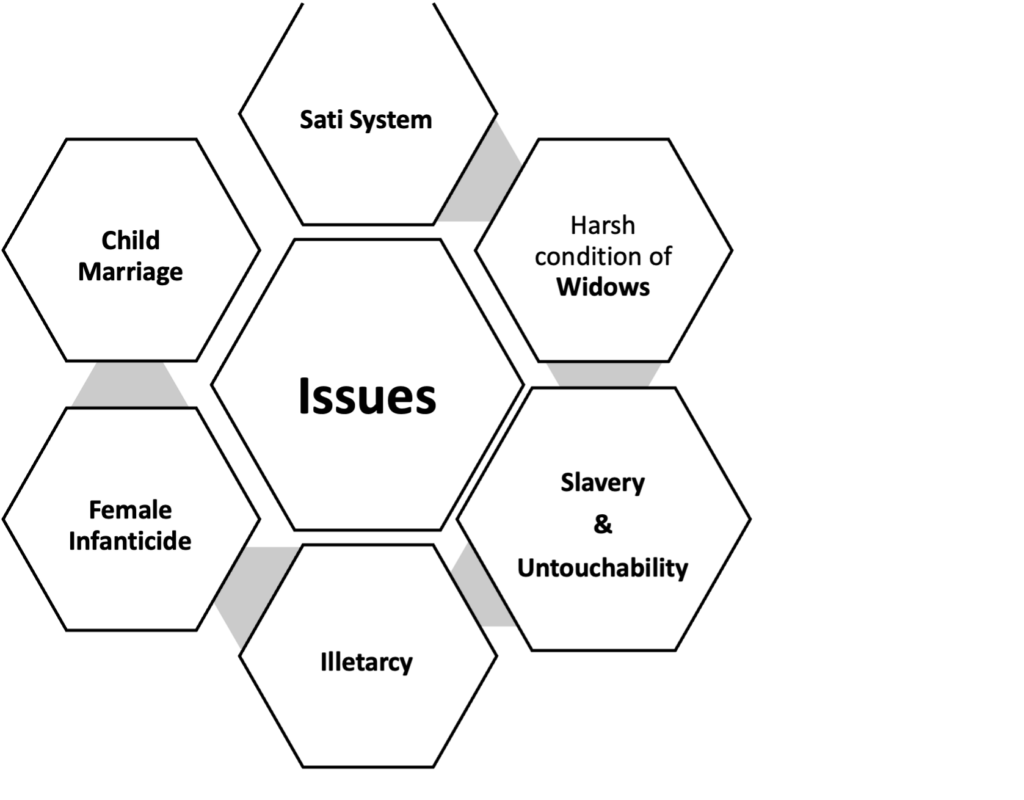Various Council Acts, Early Political Activity, Social and Religious Developments Mains Test
Mains Test Series
Various Council Acts, Early Political Activity, Social and Religious Developments
Q1. The British Empire woke up Indians from their dogmatic slumber, which led to a spiritual rediscovery of India. Elucidate (150 words)
Solution
Introduction
In the first half of 19 th century, Indian society was caste-ridden and decadent.
Some enlightened Indians, like Raja Ram Mohan Roy, Ishwar Chand Vidyasagar, Henry Louis Vivian Derozio and others, came to the forefront to reform society to curb the misery of the sufferers.
Issues of contemporary society
The Orthodox implementation of laws was based on the Dharmashastra, Manu Smriti, Sharia and Hadith. 
Spiritual revival:
Socio-religious movements:
- Ishwar Chandra Vidyasagar: He Looked into Ancient Indian texts to denounce irrational practices and suggested that widows could remarry.
- The Widow Remarriage Act of 1856 came into effect due to his efforts.
- Brahmo Samaj: Leaders like Raja Ram Mohan Roy and Debendranath Tagore tried to rediscover the Philosophy of Vedanta. This led to a spiritual awakening now known as the Bengal Renaissance.
- Bengal Sati Regulation Act of 1829 was passed due to Raja Ram Mohan Roy’s immense effort.
- Prarthna Samaj: It was a splinter group that grew out of the Bengal Renaissance’s spiritual awakening and was established under the guidance of Keshab Chandra Sen by Mahadev Govind Ranade.
- Arya Samaj: Arya Samaj was established by Maharshi Dayananda Saraswati. He called for Widow Remarriage and denounced untouchability, the caste system, idol-worship and other ritualism.
- Through Ved Samaj, Keshab Chandra Sen again tried to spread the message of Vedanta and Bhakti to the state of Madras.
- They also condemned child marriage, Female Infanticide and so on.
- Swami Vivekananda: He was known most famously for highlighting the most precious portions of Hindu Philosophy to the world.
- He also condemned untouchability. His famous saying was ‘Those who love all on this earth truly serve the Almighty’.
- Till today, Belur Math is working on the principle of Swami Vivekananda.
- Sri Aurobindo: He tried to culminate the whole of Indian philosophy into one unified whole. He encouraged the idea of Education through Mother tongue and cooperation.
- Jyoti Rao Phule, Savitribai Phule, and Tarabai Shinde opened
Satysshodhak Samaj and worked for women and depressed classes.
- In 1929, through the Sharda Act, the minimum age of marriage was raised to 14 years for girls due to their continuous efforts.
- Dr Bhim Rao Ambedkar: He led many temple entry movements; He converted to Buddhism and others of his community to protest against the unlawful practices of Hinduism.
10.EV Ramaswamy Naicker or Periyar stressed atheism, away from Brahmanical culture and led the Self-Respect movement.
The role of the British Empire in our spiritual revival:
- Rule of Law: A formal criminal code introduced by Britishers banned many social evils like Sati.
- Western Education raises the idea of common rights among the educated middle-class Indians who further enlighten society with their knowledge, as discussed above.
- Modern Ideas of liberty, equality, human rights, science and technology from the West created awareness among the population.
- The Rise of Communalism highlighted the rights of the workers in India.
Conclusion:
This is the rediscovery of India philosophically, a better understanding of religion, giving up intolerance and dogmatism. This meant that India freed itself from sleep and entered into a new modern world.
Upload Answer here
For Enquiry

Various Council Acts, Early Political Activity, Social and Religious Developments Mains Test

Administrative and Economic unification of the country, Including various charter Acts Mains Test

Consolidation of British Empire: Subsidiary Alliance, Paramountcy, Doctrine of Lapse, Maratha and Mysore Mains Test

Advent of European power, Anglo French Wars, British in Bengal. Mains Test

Maratha Empire Mains Test

Bhakti Movement Mains Test

Mughal empire Mains Test

Delhi Sultanate 2 Mains Test

Delhi Sultanate Mains Test

Rajput states (8th Century to 12th Century) Mains Test
